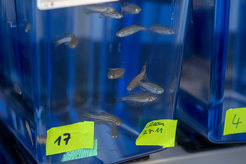Animal experiments at the Max Planck Institute for Infection Biology in 2021
An overview of animal experiments at the Max Planck Institute for Infection Biology.
April 24 is World Day for Laboratory Animals. We take this day as an opportunity to publish the animal experiment figures for 2021 at the Max Planck Institute for Infection Biology.

At the Max Planck Institute for Infection Biology (MPIIB), researchers conduct animal experiments on mice, rats, and zebrafish. With these experiments, scientists investigate fundamental mechanisms of infections and our immune system.
In 2021, a total of 1194 animals were used in experiments at MPIIB, about 19% fewer than in the previous year. The decrease is no longer as salient as between the years 2019 and 2020, where 55% fewer animal experiments were recorded. This trend is due to the restructuring of the Institute, as the two large departments of Immunology and Molecular Biology were closed in 2019 and 2020. We recently recruited seven research groups, some of which conduct animal-free research, while others work with model organisms and animal testing numbers are expected to increase again in the coming years.

At around 70%, a large proportion of the experiments involved low levels of stress for the animals, with only 2.5% of the experiments involving severe levels of stress. Most of the animal experiments in 2021 were conducted on mice (Mus musculus). Experiments with moderate and high stress were carried out for research on typhoid fever and malaria, whereby mice were infected with the respective pathogens. A small proportion of the animal experiments on mice (3%) served to train animal experimenters and animal caretakers at the Institute.

For a detailed explanation of stress levels in animal experiments, including the legal requirements and examples of stress levels, see the page of the Initiative Tierversuche Verstehen.
Animal experiments on zebrafish (Danio rerio) in 2021 were primarily conducted for genotyping—a technique researchers use to analyse the composition of genetic material—in preparation for upcoming experiments to study tuberculosis granulomas. These experiments involved only low stress levels. In addition, the animal experiment statistics also list killings under “non-recovery”. Fish were killed under anaesthesia for these experiments to obtain white blood cells for so-called "ex vivo" experiments on isolated cells.
To study white blood cell functions, animal experiments were also performed on 17 rats (Rattus norvegicus) at the Institute. These animals were euthanized for blood and cell collection.
Animal experiments are still indispensable in biomedical research—also at the Max Planck Institute for Infection Biology. They represent an important part of the experimental method spectrum, especially for research on the complex mechanisms of our immune system.
Even if the development of alternative methods is progressing steadily and some animal experiments can now be replaced or reduced—a complete replacement of animal experiments is not currently foreseeable.


